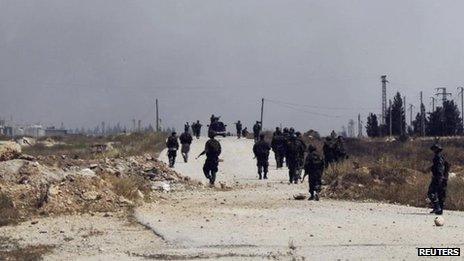US and Germany urge Russia not to arm Syria military
- Published

The US and Germany have called on Russia not to supply Syria's military with an advanced missile system they say could prolong the conflict there.
US Secretary of State John Kerry said the delivery of Russian weaponry would have a "profoundly negative impact" and put Israel's security at risk.
German Foreign Minister Guido Westerwelle urged Moscow not to hinder the chances of mooted peace talks.
In Syria, fierce fighting continued on Friday around the key town of Qusair.
Activist Hadi says: "It's like hell inside Qusair"
Dozens of opposition fighters reached the town on Friday to bolster it against an offensive involving government forces and militants from Hezbollah, the Iranian-backed Lebanese group that supports Syrian President Bashar al-Assad.
One opposition activist told the BBC the humanitarian situation in the town near the Lebanese border was worsening, with 800 wounded people needing treatment.
'Unified' government
Mr Kerry and Mr Westerwelle held talks in Washington a day after Mr Assad said a Russian contract to supply the S-300 surface-to-air missile defence system was being implemented, without confirming any deliveries.
The S-300PMU-2 - the variant experts believe will be sent - is a highly capable system that, as well as targeting aircraft, also has the capacity to engage ballistic missiles.
Two Russian newspapers on Friday quoted defence sources as saying that it was unclear if any of the missile system would be delivered this year.
Mr Kerry called on Russia not to upset the balance in the region by providing weaponry to the Assad regime, "whether it's an old contract or not".
"It has a profoundly negative impact on the balance of interests and the stability of the region and it does put Israel at risk," he said.
"We hope that they will refrain from that in the interests of making this peace process work," he said.
He added that he was convinced the Syrian opposition would take part in US and Russian-backed talks expected to be held in Geneva next month. Russian and American officials are set to meet next week to prepare the ground for the peace conference.
The BBC's Jim Muir in Beirut says a lot more needs to be done for the opposition to be in any kind of shape to attend any conference in a coherent manner.
He says that, by contrast, the Syrian government appears unified and confident.
Mr Assad said on Thursday that Syria would "in principle" attend the peace conference in Geneva if there were not unacceptable preconditions.
In an interview with Lebanon's al-Manar TV, which is owned by Hezbollah, he warned that Syria would respond in kind to any future Israeli air strikes.
Qusair crisis
Meanwhile, Syrian state television said troops and Hezbollah fighters had captured the Arjun district of Qusair on Thursday.
An attempt to get wounded people out of the town on Friday had failed, an opposition activist told the BBC, as the convoy had come under attack, with nine people killed.
The source said 30,000 people were still in Qusair, 80% of which was under rebel control, although these figures cannot be independently verified.
"There is no water at all, because the Assad regime controls the water supply, and there has been no electricity for four months," he said.
More than 80,000 people have been killed and 1.5 million have fled Syria since the uprising against Mr Assad began in 2011, according to UN estimates.
How the Russian S-300PMU-2 missile defence system works
- The long-range surveillance radar tracks objects over a range of 300km (185 miles) and relays information to the command vehicle, which assesses potential targets
- A target is identified and the command vehicle orders the engagement radar to launch missiles
- Launch data is sent to the best placed of the battalion's six launch vehicles and it releases two surface-to-air missiles
- The engagement radar helps guide the missiles towards the target. It can guide up to 12 missiles simultaneously, engaging up to six targets at once
The vehicle used as a launcher is currently manufactured at the Minsk Wheel Tractor Plant (MZKT) in Belarus, although Russia is now shifting the production to its western city of Bryansk.